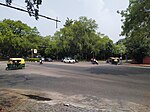DRDA has traditionally been the principal organ at the district level to oversee the implementation of anti-poverty programmes of the Ministry of Rural Development. This agency was created originally to implement the Integrated Rural Development Programme (IRDP). Subsequently the DRDAs were entrusted with number of programmes of both state and central governments. From April 1999 a separate DRDA Administration has been introduced to take care of the administrative costs. This aims at strengthening the DRDAs and make them more professional in managing the anti-poverty programmes and be an effective link between the ministry and the district level.
Rural development and poverty alleviation programmes are implemented on a decentralised basis, keeping in view the large geographical areas, the administrative requirements and the need to involve grassroots-level officials and the community in the implementation of the programmes. At the central level the Ministry of Rural Areas & Employment has been implementing these programmes. The Ministry is responsible for the release of central share of funds, policy formulation, overall guidance, monitoring and evaluation of the programmes. At the State level Prl Secretary, Rural Development and the Commissioner of Rural Development are overall incharge for implementation of the rural development programmes. At the District level, the programmes are implemented through the DRDAs (District Rural Development Agencies). The governing body of DRDA includes Members of Parliament (MPs), Members of Legislative Assemblies (MLAs), District level officials of Development Departments, Bankers, NGO's and representatives of weaker sections of the society. The District Collector used to be (but not always at present) the Chairman of the Governing Board. The Governing body at the district level provides guidance and directions to DRDA. The body in DRDA responsible for actual implementation is headed by an Additional District Collector.
Many Schemes of the Central and State Governments are introduced from time to time. Several schemes are available providing support to different components of Rural Development. Schemes are also periodically modified to reflect the experience over the years. The task of DRDA has been to identify the needs of the rural population and reach the appropriate schemes where they are needed. In implementing the schemes, the role of the DRDA has been Technical, Managerial and Financial. Thus DRDA is not only a body to disburse the funds for the schemes but also provide appropriate Managerial and Technical support.
District Rural Development Agencies (DRDAs) are district level development execution and monitoring agencies created under the Indian Societies Registration Act. Substantial sums of rural development funds of government of India were transferred and routed through them under various Centrally Sponsored Schemes. From purely a financial resource from Rural Development point of view the DRDAs are extremely important institutions at the district level.Hardeep







